Tribe and the Trading Deadline

Ah, the Indians.
Those beloved Wahoos from the shores of the Cuyahoga.
A year removed from a 93-win season, our beloved Tribe is in 4th place in the AL Central and could lose over 90 games this season.
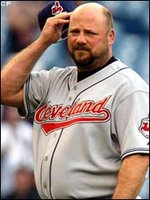 Its no secret the season is lost.
Its no secret the season is lost.With the trading deadline rapidly approaching we've seen the Indians make two moves in the last week. First, the Tribe sent closer Bob Wickman to the Atlanta Braves for class-A minor league catcher Max Ramirez.
Six days later, Mark Shapiro swapped Indians starting first baseman Ben Broussard for Seattle Mariners outfielder Shin Soo Choo.
In the aftermath of these two deals, fans and media alike have been scratching their heads.
After all, how could Bob Wickman, the Indians all-time saves leader, only bring back a class-A catcher in a deal?
Why didn't Mark Shapiro wait another week and see if Wicky's value increased?
Broussard was hitting well over .300 and is under contract for another two years. Why trade him for a minor league outfielder?
Here's why:
Wickman is at the end of his career. He has two months remaining in the 2006 season and is expected to retire after its conclusion. While still relatively effective as a closer, he pitches to contact and does not posses great stuff.
Wickman's value was much higher in the eyes of Cleveland fans than in the eyes of executives across Major League Baseball. I hate to break it to some of you, but 38-year-old closers with two months remaining not only on their contract but in their career generally do not bring much more than a class-A catcher in return.
"But then," many ask...
"Why not wait another week and see if his value goes up?"
I'll tell you why, and the answer is two-fold.
Ronnie Belliard and the 10-5 rule.
Belliard was a prime target to be dealt before the July 31st trading deadline. Then Belliard pulled a hamstring a week ago.
Now there is no way the Indians can move Belliard for anything of value before the deadline.
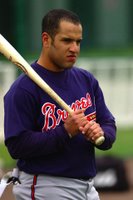 The Indians saw a player they liked in Max Ramirez and pulled the trigger on the Wickman trade. While they may have been able to squeeze a tiny bit more out of another team in exchange for Wickman had they waited another week, the odds were just as good that Wickman could have been injured or been lit up in an appearance this week, therefore lowering his value even more.
The Indians saw a player they liked in Max Ramirez and pulled the trigger on the Wickman trade. While they may have been able to squeeze a tiny bit more out of another team in exchange for Wickman had they waited another week, the odds were just as good that Wickman could have been injured or been lit up in an appearance this week, therefore lowering his value even more.It wasn't worth waiting.
Now for the 10-5 rule.
Bob Wickman had a right to veto any trade as a result of the "10-5 rule" which states that a player must approve any trade if they have over 10 years of service time in the big leagues, five of which have been with their current team.
It was widely believed that three teams expressed an interest in Bob Wickman.
Problem is this: Wickman reportedly turned down trades to two different teams before agreeing to be dealt to Atlanta.
So if there were three teams interested and Wickman rejected trades to two of them, that leaves one team left...
The Atlanta Braves, who offered Max Ramirez.
So why wait?
On to the Broussard trade...
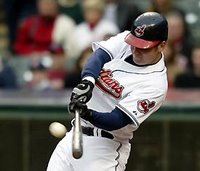 Although he is in the midst of a career year, trading Ben Broussard makes a great deal of sense on many fronts. First off, Ben's value will never be higher. Secondly, he was a platoon player having a career year who is slated to go to arbitration this offseason. (Broussard likely would have been awarded a one-year contract worth over 5 million in arbitration, a bit of a hefty price for a part time player)
Although he is in the midst of a career year, trading Ben Broussard makes a great deal of sense on many fronts. First off, Ben's value will never be higher. Secondly, he was a platoon player having a career year who is slated to go to arbitration this offseason. (Broussard likely would have been awarded a one-year contract worth over 5 million in arbitration, a bit of a hefty price for a part time player)In addition, while Broussard stepped up his game significantly this season offensively, he has continued to make more mental mistakes than anyone on the Indians roster.
Whether throwing to the wrong base or getting picked off while running the bases, Ben's head wasn't always in the game, leaving him at-odds with manager Eric Wedge.
Physical errors are acceptable. They happen to everyone and are a part of the game.
Continuous mental mistakes are not.
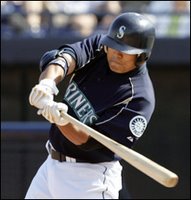
In dealing Broussard the Indians accomplish a couple things. First, they bring in a talented corner outfielder in Shin Soo-Choo who is major league ready. Choo has hit for average at every level, possesses Sizemore-like speed and has an above average arm for right field.
Seattle considered him one of their best prospects going into the season, but his value to the organization was diminished with Ichiro, Jeremy Reed and Raul Ibanez entrenched in the Mariner outfield.
In addition to adding a promising young corner outfielder, the Indians also free up an impact position at first base. With Broussard on the roster, adding an impact first baseman via free agency this offseason was not an option. Considering the public outcry for the Dolans to spend money after the failures of the 2006 season, the Indians have no choice but to open up the wallet in free agency this offseason.
Had Broussard not been moved, the only positions "of need" for the Indians this offseason would've been at second base and in the outfield. By trading Broussard the Tribe now has increased flexibility, meaning an impact first baseman could be added to the shopping list this offseason while exploring other options at the other positions of need.
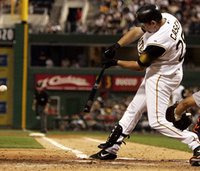 Remember the name Sean Casey.
Remember the name Sean Casey.I'll have more coming up in my first of multiple "Offseason Outlooks" coming up this week.
(That's right, it's not even August and we're going to start exploring off-season options...)
Only in Cleveland.
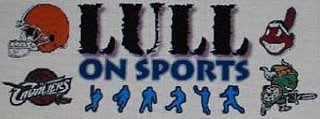

0 Comments:
Post a Comment
<< Home